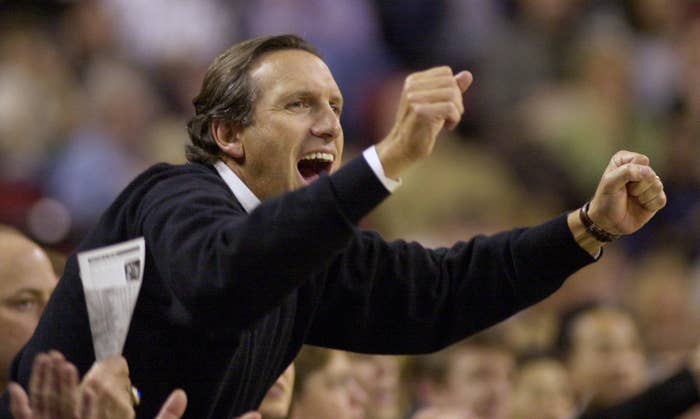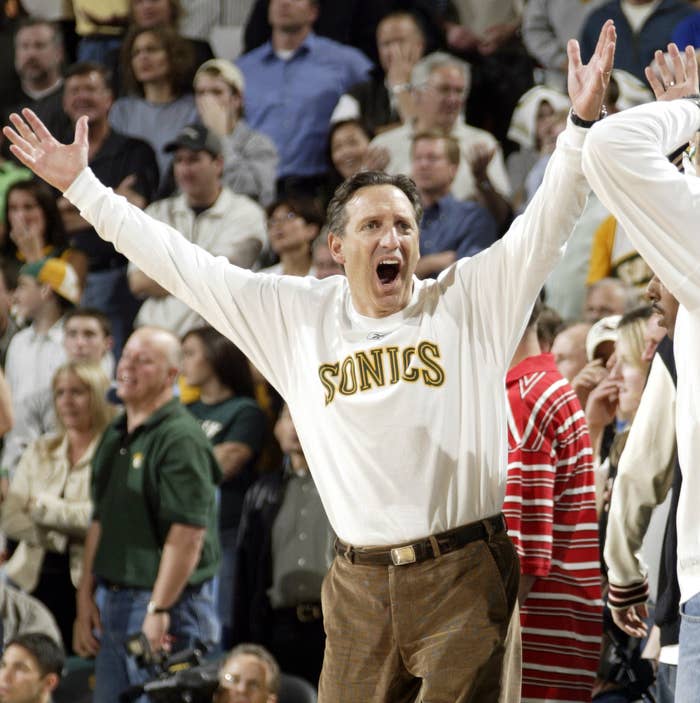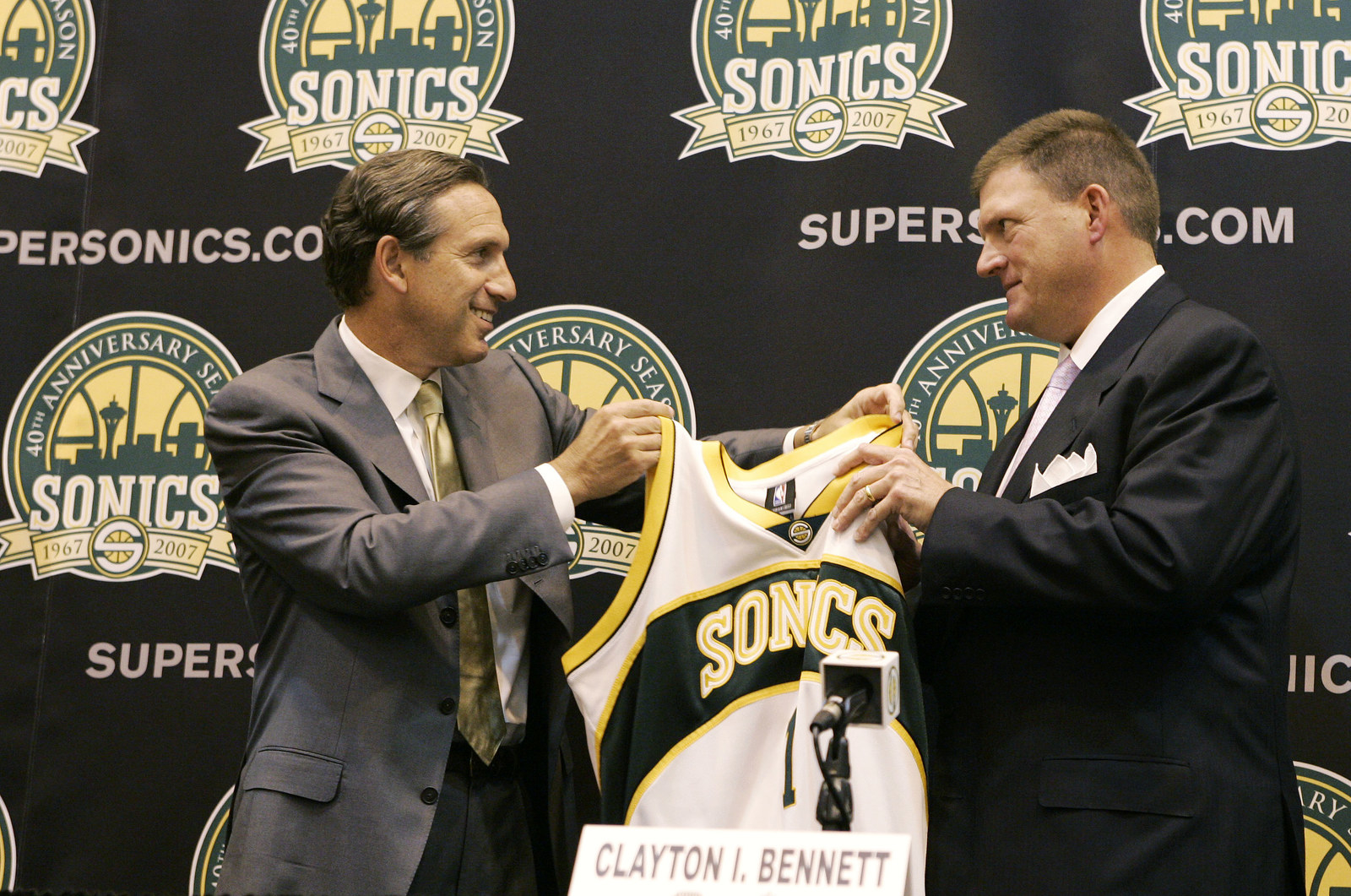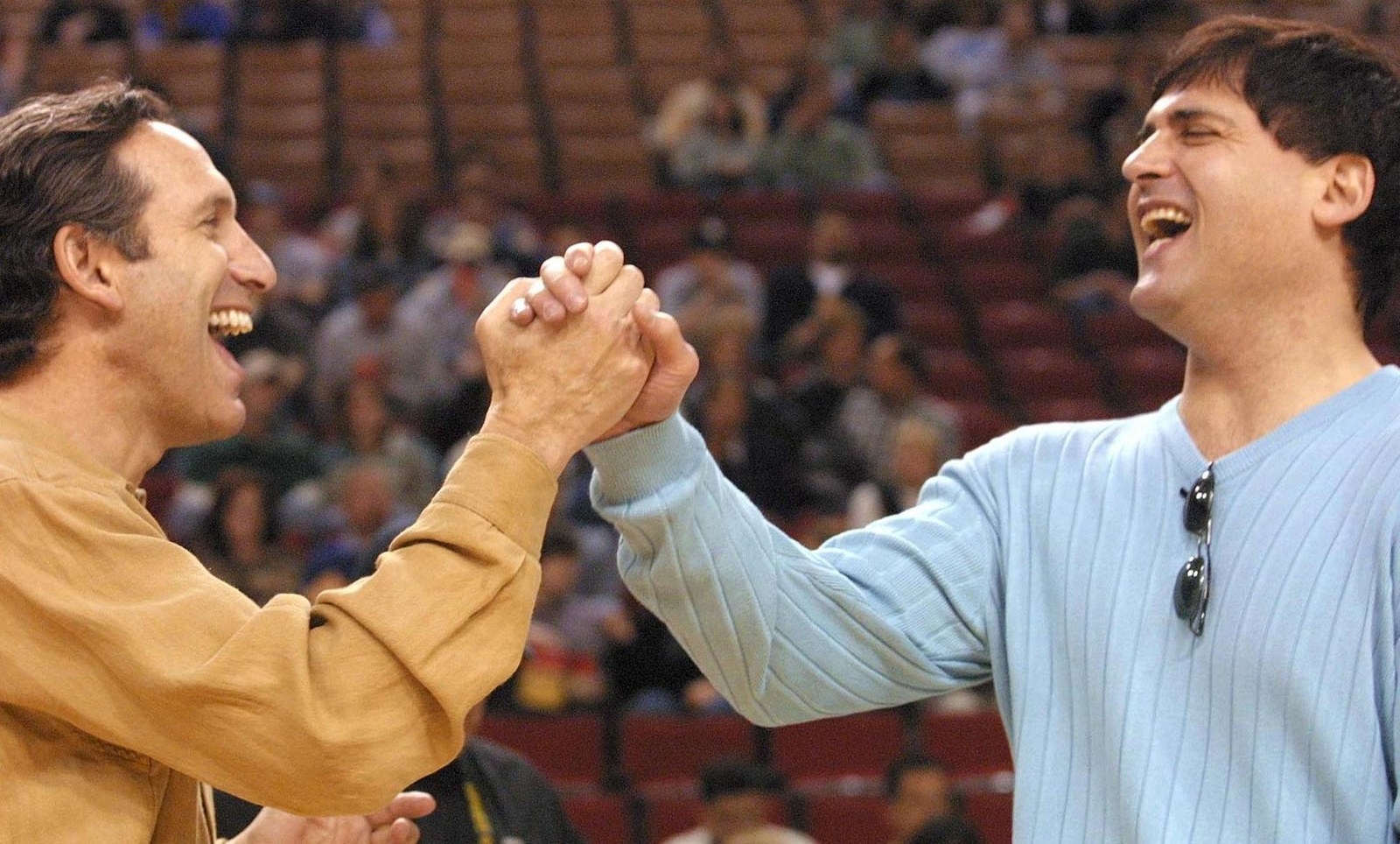
The news arrived with much fanfare. Howard Schultz, the Starbucks mogul, was going to make a “big announcement, really great announcement,” the public relations staff told reporters. There were “balloons everywhere” and “festive music playing.” What Schultz was doing was cast as “great thing,” a heroic act.
It was 2006, and Schultz was announcing that the Basketball Club of Seattle, of which he was the face and the largest stakeholder, had sold the Seattle SuperSonics and the WNBA’s Seattle Storm to Clay Bennett, a businessperson from Oklahoma City. The sale, Schultz said at the time, was the best hope for keeping the team in Seattle. Bennett insisted he had no plans to relocate the team. By the 2008 season, the Seattle SuperSonics were the Oklahoma City Thunder.
Steve Kelley, a former sports columnist for the Seattle Times who wrote extensively about the Sonics, recalled it as “the most insulting, disingenuous press conference that I’ve ever been in,” just “lie after lie after lie.”
“It was,” he recounted, “the worst day in Seattle sports history.”
Twelve and a half years later, Schultz made another announcement. In lieu of balloons, there was a newly formed Twitter account. In lieu of festive music, the tick-tick-tick-tick intro of CBS’s 60 Minutes, where Schultz announced that he was seriously considering a bid for president as a “centrist independent.” The two major parties, he charged, were engaged not in making things better for the American people, but in a “reckless failure of their constitutional responsibility.” Someone “not in bed with either party,” Schultz said, was the best hope for fixing the country’s ills.
In the two weeks since, Schultz has been raked over the coals by Democrats, who think a third-party candidate will pull away enough votes from the Democratic nominee to hand President Donald Trump a reelection. Once again, Schultz has become the villain of the story.
Schultz’s initial forays into the presidential arena have strong echoes of his early days as the owner of the Sonics. Then as now, he has presented himself as a successful businessperson ready to extend himself beyond Starbucks and remake troubled institutions.
Now, Schultz told the Seattle Times when he announced his potential campaign, “I think the American people are longing for and desiring leadership they can trust and a government that is working for them.”
Then, Schultz told David Shields, in remarks published in the book Body Politic: The Great American Sports Machine, “If I look at the fracturing of the SuperSonics over the last few years, the word ‘trust’ is all over this thing, because the fans lost trust in this team, the players lost trust in one another, the players lost trust in the organization, the organization lost trust in the players."
Schultz’s presidential bid is fundamentally a quest to change campaign politics as we know it. In New York last week, at an event ostensibly to promote his new book, released a day after he announced his potential presidential aspirations, he posited that an independent candidacy could radically alter how the president is elected. Instead of it all coming down to seven to 10 swing states, he proposed, “What if an independent candidate could create a 50-state race?”

Similarly, he proposed in 2001, the NBA’s culture and ownership model needed to be overhauled. Like a government that no longer worked for the people it purported to represent, the NBA was not doing right by its fans.
“The players too often play selfishly and with a disrespect for the fans and their game. Too often, the owners have made the whole experience of going to a game too commercial,” he told the New York Times then.
“The concept of owning and operating a sports team today has to be reinvented,” he added. “What has to be done, essentially, is exceed the expectation of the fan and community."
When Schultz bought the Sonics, fans and sports columnists thought he might be what the team needed. He held “town meetings” with fans to hear their concerns about the team and how the experience of attending a Sonics could be made better. He reduced the cost of tickets to make games more accessible, and reduced the cost of concessions for the first hour of the game. He instituted a policy of letting fans hang out courtside before the game, while the team warmed up. He wrote a cheery, semi-regular column for the Seattle Times about what he was learning as a new owner.
"I don't want to presume that I can come in and do to my basketball team what we've been able to accomplish with Starbucks," Schultz said in the 2001 New York Times story about changing the culture. "But I can try to take a slice of that and bring it to a professional team.
Nearly 18 years later, Schultz is careful not to suggest that his experience running Starbucks directly qualifies him to be the leader of the free world. But asked in New York why he’s qualified, he points to his “life experience,” which, he says, “I believe, has given me a level of understanding of people who are falling behind and don’t have access to the American dream and I have been fortunate also to be on the other side of wealth creation, and understanding the responsibility that goes with wealth and power. And I believe I can bring that.”
“Howard’s full — sort of like his presidential run now — he’s full of good ideas, but in a lot of ways he’s full of shit,” said Kelley.
Speaking to the press following the 2006 announcement that he had sold the team, Schultz confessed to “some naiveté coming in.” From the start, the team was a money suck, losing “tens of millions of dollars” each year, by Schultz’s own estimate. The KeyArena, where the Sonics played, was small for an NBA venue, limiting profits on tickets and concessions. And much of the money that did come in went to the City of Seattle, which had helped fund construction of the KeyArena, leaving a debt that the team had to pay back, plus rent, until the lease ended in 2010.
It was, Schultz said at a book event in Seattle last week, in a mea culpa for his role in the Sonics leaving, “the worst professional sports lease, not only in basketball but perhaps in any other sport. And I knew that going in. I had the personal belief, and at the time, the naiveté that I would be able to convince the city council and the mayor that we were buying the team, and that we couldn’t possibly make a profit, but we didn’t want to lose so much money — could we renegotiate the lease to make it more equitable.”
By 2004, rumors were circulating that Schultz wanted out. Three years into his “five-year plan” to turn the Sonics into a championship team, the team had made the playoffs only once. In 2003, the Sonics had traded Gary Payton, a 13-year veteran of the team and a future Hall of Fame point guard, after a contract dispute that played out in the press in increasingly personal terms, and culminated with Payton skipping the first day of training camp. On the first day of training camp in 2004, Schultz admitted he had thought about selling the team, but heading into the new season, he told reporters he remained committed.
“He always sounds real convincing about how he feels about things,” recalled Kelley.
But the KeyArena remained a sticking point. Schultz and the Sonics owners wanted public funding to build a new arena or renovate the current one. It was a luxury that had been afforded, in some form, to the city’s football and baseball teams, and the city council made clear it was not eager to do so again.
The offers that were made were deemed insufficient by Schultz and the other owners. “The basic thrust of it was: We like sports, any kind of sports is fine, but the public has to receive a fair handshake, and we need to get back any money we put out,” recalled Nick Licata, then a city council member and a member of Citizens for More Important Things, a group founded in the ’90s to push back on public funding for a facility for the Mariners, and reinvigorated in the fight with the Sonics.
“The political powers at the time were not interested in doing anything to help the owners of the Seattle SuperSonics renegotiate the lease or do anything to help us,” Schultz said last week.
Efforts to push it through the state legislature were hamstrung by the body’s operating speed.
Carl Hirsch, whose sports advisory business consults on things like helping teams get new stadiums built, and who was brought in to help the Sonics negotiate for a new stadium, said Schultz was getting a bad rap.
“I do this for a living. I’ve done this in a lot of places, so this is a deal that should’ve gotten done. This is a community that at that time just wasn’t ready to do it,” he told BuzzFeed News.
“If you’re asking my opinion, none of this falls to the Sonics as their fault,” he added. “They were very proactive in trying to do it.”
Schultz began to say publicly that without a new deal, the current ownership would likely have to sell or move the team. Seattle, said then–NBA commissioner David Stern in an April 2006 conference call, was making clear it was “not interested in having the NBA there."

At the press conference announcing the Sonics sale to Bennett in 2006, Schultz cast the sale as a way to keep the team in Seattle, suggesting that Bennett would be better able to negotiate a new arena deal. He thought, he explained in Seattle last week, that the threat of an out-of-state owner moving the team would give Bennett more political leverage.
It was a confidence shared by few. On Feb. 10, 2006, the Associated Press had run a story about a group of investors forming a group to acquire a stake in an NBA team with the express purpose of bringing that team to Oklahoma City.
"The bottom line is, we want a team for this market," said Bennett, who brought the group together.
Nate McMillan, who coached the Sonics for most of the Schultz era, said as much upon learning of the sale.
"I would just think if someone from Oklahoma bought a team, they're going to want to see that team," McMillan, who by 2006 was coaching the Portland Trailblazers, told the Columbian.
Even Schultz didn’t seem to believe it, Kelley said.
“Howard’s a cool dude, and he’s charismatic, and he’s always in control and here he is, he’s got flop sweat,” Kelley recalled, describing Schultz as he went to speak to reporters individually. “Even he understands how crazy this is and how insulting it is to the reporters. And he was sputtering, he was stammering, he was being un-Howardlike. And it was like, ‘What’s going on here? Just tell us the truth.' And he couldn’t. And I’ve never seen him so uncomfortable and off balance.”
Schultz, who grew up in New York, was intimately familiar with the pain the relocation of a sports team brought to fans.
"As a young child, there are certain intrinsic events that become part of your sports DNA," Schultz recounted at the 2002 Associated Press Sports Editors convention, according to the Seattle Times. "The Dodgers decided to leave Brooklyn, and my father announced to the family that from this day on, we will not watch, listen or mention the Dodger name in this household. And I remember that as if it was right now."
Schultz’s family became Yankees fans after that. But he rooted for the Red Sox in the 2018 World Series when they faced the Dodgers, according to Gen. Peter Chiarelli, who is working with Schultz and who his nascent political operation put on the phone to discuss the ill-fated Sonics.
In New York last week, Schultz described selling the Sonics “the biggest professional mistake I’ve made.”
“I’m human, I’m not perfect, I can’t undo it, and I feel terrible about it,” he added.
But Schultz evidently did not relish his role as the big bad responsible for sending away the Sonics. “He felt betrayed or hurt by a lot of the columnist-type people in this town,” said Kelley, who spoke to him often when he owned the Sonics. But he heard about those bad feelings through others.
“He told everybody else. He never did call. ” Kelley said.

Chiarelli — speaking as someone working on this Schultz effort, but, he noted repeatedly, not for Schultz himself — said he felt Schultz was bearing an unreasonable brunt of the blame. A Seattle native, Chiarelli grew up a Sonics fan — by happenstance, he said, he had worn his Sonics socks to work that day.
“I was in Iraq when he sold the team, and I remember reading all the clippings from Baghdad as I was commanding the First Cavalry Division and going to bed crying at night,” he told BuzzFeed News. “This was my team. They were the beginning of my love of professional sports.”
But, he said, “I’ve always looked at NBA leadership and Seattle City leadership as being the real culprits here."
“I am not in any way giving him a free pass on what happens,” he went on, but noted that Schultz wasn’t the only owner, nor even the majority stakeholder. “I think for everybody to focus all their ire on Howard Schultz in this thing is, to me, unfair.”
“I really believe he learned from his mistakes,” he said.
Besides, he said, “If the Sonics ever came back,” as some in Seattle are trying to make happen, “this stuff about Howard Schultz, it would be yesterday’s news.”
Many Sonics fans, who still hold a candle for the team, are unwilling to forgive. An apology "seems pretty insincere and a little late to the game and opportunistic at this point,” said Jason Reid, who along with Adam Brown, produced the 2012 documentary Sonicsgate: Requiem for a Team.
At the Schultz book event in Seattle last week, a large crowd formed outside to protest. Reid and Brown were among them. Reid gave a speech, and they handed out DVDs of the film “to virtually anyone who would take them.” The goal of being there, as was the goal of making Sonicsgate, said Reid, was to “hold all the guilty parties toward the wrongs they did to the citizens of Seattle, and the number one villain on the list is Howard Schultz.”
“Our wound is still fresh and not healed here,” he told BuzzFeed News.
“I was more concerned that he would run as a Democrat and then I’d have to be sort of anti-Schultz when he was running against Trump,” said Reid.
In Seattle, the politics has collided with the personal.
In 2005, Seattle Times reporter Jayda Evans posed a series of questions to the people who were then the power centers in the Sonics organization, among them: what would you “rather lead, [a] country or [a] company?
As Schultz mulls a presidential bid, some are wishing the answer he gave then had been dispositive.
"Since my experience has been based on 25 years of building and leading a company,” Schultz said. “I'll stick with what I know.”
